Doing stretches on a regular basis when you’re pregnant can help you feel your best. The following stretches are useful for easing some of the aches and pains that are common during pregnancy, such as back pain.
For most pregnant people, starting slowly and gradually moving up to 10 repetitions of a stretch each day works well. But for some people with high-risk pregnancies or pregnancy complications, stretching may not be advised. Talk to a member of your health care team to make sure that these stretches are safe for you.
Low back stretch
This low back stretch may help ease backaches Start on your hands and knees with your head in line with your back. Pull in your stomach, rounding your back slightly. Hold for several seconds. Then relax your stomach and back. Keep your back as flat as possible, and don’t let it sag down.
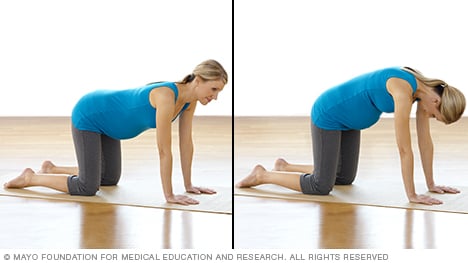
Backward stretch
To stretch your back, pelvis and thighs, try the backward stretch. Start on your hands and knees. Keep your arms straight and your hands directly beneath your shoulders. Curl backward toward your heels as far as is comfortable for your knees. Tuck your head toward your knees and keep your arms extended. Hold for several seconds. Then go back to the starting position.
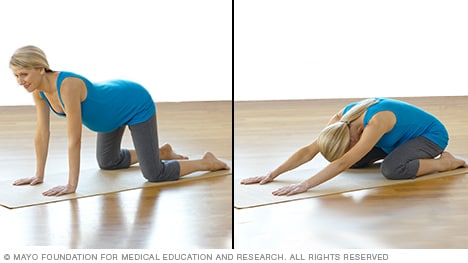
Backward stretch with fitness ball
You can do the backward stretch with a fitness ball. Start on your knees. With straight arms, put your hands on a fitness ball in front of you. Curl backward slowly in the direction of your heels as far as is comfortable for your knees. Hold for several seconds. Then go back to the starting position.
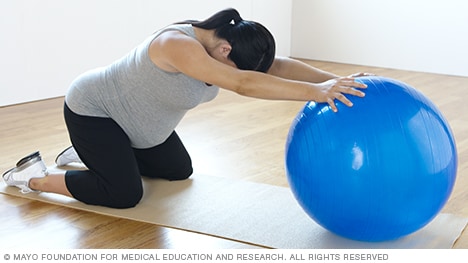
Standing pelvic tilt
The standing pelvic tilt is another way to stretch the muscles in your lower back. Stand up straight with your back against a wall and your feet about shoulder-width apart. Push the small of your back against the wall. Hold for several seconds. Then go back to the starting position.
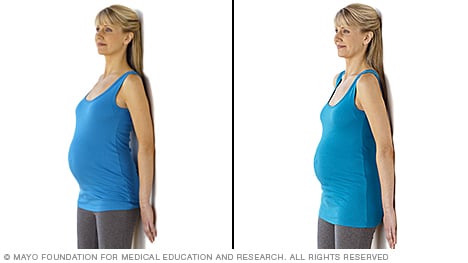
Pelvic tilt with fitness ball
You can do the pelvic tilt with a fitness ball. Sit on the floor with the fitness ball behind you. Lean against the ball. Keep your feet flat on the floor and your arms at your hips. Push the small of your back upward. Hold for several seconds. Then go back to the starting position. When you do this stretch, have someone nearby to help in case you lose your balance.
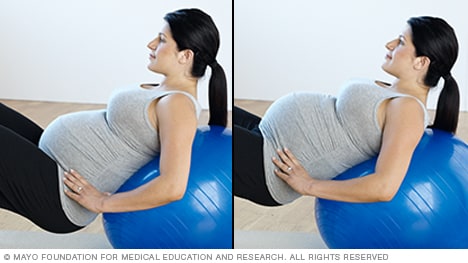
Torso rotation
To stretch the muscles in your back and upper torso, try the torso rotation. Sit on the floor with your legs crossed. Hold your right foot with your left hand. Then move your left hand behind you, and slowly open your upper body to the right. Hold for several seconds. Then go back to the starting position. Switch hands and repeat on the other side. If sitting on the floor isn’t comfortable, sit on a mat or a towel.
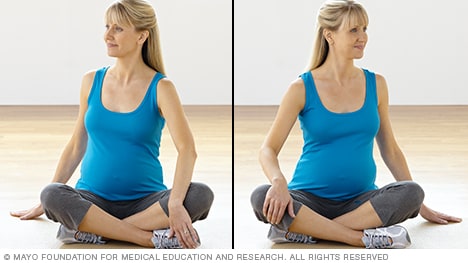
To stretch the muscles in your back and upper torso, try the torso rotation. Sit on the floor with your legs crossed. Hold your right foot with your left hand. Then move your left hand behind you, slowly twist your upper body to the right. Hold for several seconds, then return to the starting position. Switch hands and repeat on the other side. Gradually work up to 10 repetitions on both sides.
If you’re uncomfortable sitting on the floor, try sitting on a mat or towel.
July 28, 2023
- FAQs: Back pain during pregnancy. American College of Obstetricians and Gynecologists. https://www.acog.org/womens-health/faqs/back-pain-during-pregnancy. Accessed June 14, 2023.
- FAQs: Exercise during pregnancy. American College of Obstetricians and Gynecologists. https://www.acog.org/womens-health/faqs/exercise-during-pregnancy. Accessed June 14, 2023.
- Artal R. Exercise during pregnancy and the postpartum period. https://www.uptodate.com/contents/search. Accessed June 14, 2023.
- Laskowski ER (expert opinion). Mayo Clinic. June 15, 2023.
- Marnach ML (expert opinion). Mayo Clinic. June 15, 2023.
See also
.
Note: This article have been indexed to our site. We do not claim legitimacy, ownership or copyright of any of the content above. To see the article at original source Click Here













